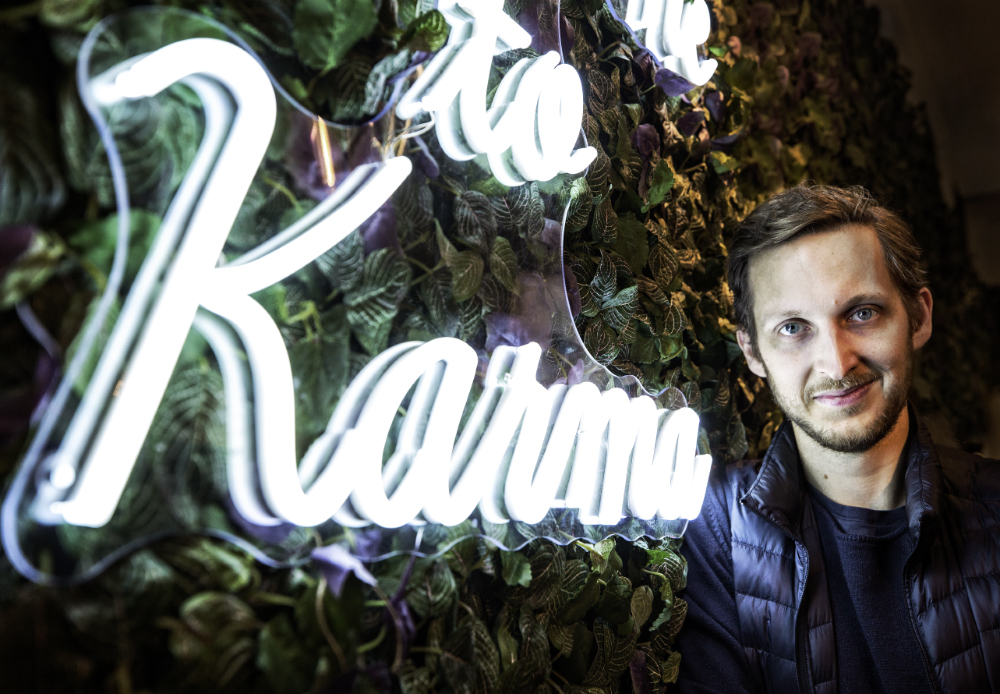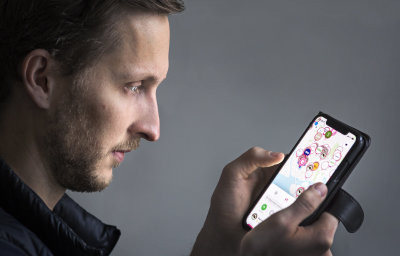Ludvig Berling - the ideas that led to Karma

Hi Ludvig Berling! You are a KTH alumnus and one of the founders of Karma, but already as a student, you had several ideas and companies. Tell us about your road to Karma!
KTH Innovation meets hundreds of teams with new ideas every year, but not all of them go all the way to the market. In 2009, one of those ideas was yours. Tell us!
"It was in my first year at KTH. We had a project course where we were supposed to develop an idea for a product. As students, we often brought lunch to Campus, and we figured it would make life easier if we could fold up our lunch boxes after we were finished eating. When the course was over, we felt that the idea was interesting enough that we wanted to see if we could continue working on it. A few weeks earlier, KTH Innovation had visited out class, so we got in touch and got to talk to a coach. We got some funding to produce a prototype, which we did, but in the end, we didn’t take it further from there. In retrospect, it feels reasonable that we came up with an idea that could make our lives as students easier."
Was this your first contact with the entrepreneurial world?
"Yes, but we didn’t get that much insight into the world of entrepreneurship. There is so much more to it than developing a prototype. We didn’t do any market research or testing. What I did get was a taste for developing products! I also realized that was possible to get support at KTH outside of your education."
What happened next?
"My friend Hjalmar was good at developing apps and we built a few different things together, like a map game and an app to practice reading musical notes. Hjalmar was a medical student and in the summer of 2012 he worked at a clinic. They wanted their patients to complete an evaluation, but it would take weeks to get the answers since it was done with pen and paper. Hjalmar suggested that we make an app instead so that they could get the answers in real time. That became the basis for our first company Responster!"
"We put together a simple app and hung an ipad on the wall at the clinic. The response was super positive, and they soon asked us to implement the solution at other clinics. We put all our time outside of school into implementing the service all around Stockholm. Before we graduated in 2014, we had continued to develop the company and had raised capital to grow our team. When we left school, we went straight to a full-time job in our company."
Response is still active today, but without you and Hjalmar. Why?
"We continued for a year, but both of us have always felt that we wanted to do something that could have a bigger impact on more people. Responster focused on companies and we preferred to work with something consumer-oriented. So, Hjalmar and I left the company and the third founder continued on his own."
The next company you co-founded was Karma, but you tried out several different versions before you found the right one. Tell us more about that!

"Our first idea was a loyalty service for small businesses. In 2015, Bluetooth was the hottest thing in retail, so our idea was to create a digital coffee card that would work via Bluetooth. The problem was that only around 20% of visitors had Bluetooth turned on, so the concept failed."
What happened next?
"We scrapped the idea and changed our minds. Our next plan was to create a kind of Let’s Deal for physical offers in stores. We started building a platform and a network where users could share what they found, like sales or special offers. We made grandiose plans to launch in Brazil and India that were offer-friendly markets. I studied Portuguese in the evenings to be able to make Facebook ads, but after a while we realized that our target group was too wide. The app had offers for everything from "buy three avocados, pay for two” to sales on more expensive brands. Who was our customer?"
"By now, it’s the summer of 2016. There are only days left before we run out of the money from our investors. Us four founders locked ourselves in a room and closed the door. We wouldn’t come out until we had an idea of what we were going to do."
You came out of the room with the idea that most people associate with Karma today; saving food that is at risk of getting thrown away. How did you come up with that idea?
"When we worked with the coffee card idea, we often heard the cafe owners say "if you come back right before we close, you can buy what we have left at a discounted price". We thought, “what if we could help save leftover food?” In the offer app, our customer could be anyone, but now we wanted to develop a service that we could prove that a small group of people really appreciated. We decided to do a pilot project with just thirty users and two companies, a restaurant and a café. Back then, we had no backend platform so I had to sit down at t
"We tried it for three weeks and it went well. We decided to go for it! In November, we had reached our goal of getting 30 restaurants and cafés onboard. We launched Karma and the rest is history!"
Do you have any tips for students who have an idea they are thinking of?
"My most important lesson is that it's all about team and timing. You need to have the right kind of people around you, and you need to launch the right kind of idea at the right time."
"I don’t really like the word “networking” but getting out there and meeting people is so important. There is a really strong startup network in Stockholm, both at KTH Innovation but also in other places around the city. There, you can meet like-minded people and get a feel for the idea you are thinking about. I would never have been able to go through this journey by myself! It is so important to find good people."
Text: Lisa Bäckman